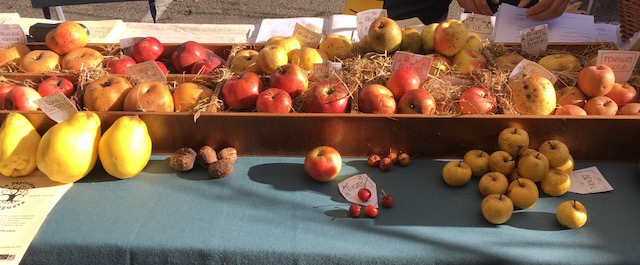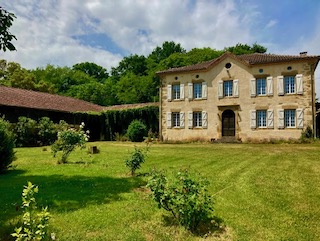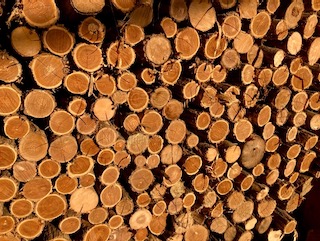View from the Foothills of France Some personal views on living, working,
bringing up family and making the dream happen in the most beautiful region of France. View from the Foothills of France also includes some personal and professional thoughts and tips on finding and buying the perfect property in the Ariège and Haute Garonne regions.
|
By nadia, on 23rd November 2021 
The French government has announced plans to ban the use of plastic packaging for most fruit and vegetables from January 2022. This follows on from laws which came into effect from January 1st this year banning single-use plastic plates, cups, cotton buds, plastic straws, and cutlery.
The new plastic packaging ban will apply in the first instance to harder fruit and veg such as leeks, peppers, and apples. It will then be rolled out to tomatoes, green beans, and other more delicate items by June 2023 and finally to salads and berries.
Retailers who fail to comply will face hefty fines. About a third of fruit and vegetables sold in France is currently wrapped in plastic. Each consumer will also have the right to be served using their own container, as long as it is clean and adapted to the nature of the product being purchased.
In a further effort to reduce plastic waste, from 2022 there will be a ban on plastic tea bags. Fast-food chains will no longer be able to give away plastic toys and water fountains will become mandatory in public places (including schools) in order to reduce public dependency on plastic bottles. Restaurants will also be compelled to offer free still water to their clients.
There are more proposals in the pipeline to reduce plastic use in France even further in the next few years and it is also now mandatory to provide consumers with accurate information regarding proper waste sorting and details of the composition and recyclability of material.
Here in the foothills, shopping at local markets, home-grown produce, paper bags and shopping baskets have never fallen out of favour and so, again, Southwest France is head of the game when it comes to a more environmentally sustainable way of living but at least now chain supermarkets will be forced to follow suit.
If you are thinking of moving to France or buying a holiday home here, please do get in touch to see how I can help: nadia@foothillsoffrance.com
Like this:Like Loading...
By nadia, on 9th November 2021  Autumn colours in the Pyrenees The French property market is very buoyant and has been for the last two years with house prices in France showing a rise throughout the country of an average of +5.8% this year, which is the 20th consecutive quarter of rising property prices. The projection for house prices in France shows a continuing upward trend of +3.1% during 2022 according to the Notaires de France.
So, if your dream is to buy a property in France either as your main home or a holiday home, it might be worth starting your search sooner rather than later as the era of historically low property prices in France could well be over and already buyers are starting to find themselves priced out of the most popular areas.
There are a few key points to keep in mind as you begin your search, particularly when considering the location, the type of property and how you plan to use it. It can help to make a checklist to keep focused on your priorities and practical considerations (so that, once ticked, you can let your heart take over).
Where do you want to be in France?
Consider climate, accessibility, and surroundings (hills, lakes, coastal, mountains, village or city). Do you want heat and a Mediterranean climate or grass and rivers and forests? Would you like to be close to facilities and services and have neighbours or be isolated (most people tell me they want to be isolated but walking distance to a boulangerie and café!) Do you need to travel frequently in which case you will need to be close to a large city with an airport or a TGV line?
What kind of property do you want?
Consider the number of bedrooms you need and how much land you want. Do you want a character property or something more modern? How about taking on a renovation project or would you rather just move straight in?
Is this a permanent home, a holiday home or are you planning to run a business?
If it is a permanent home, do you plan to work from the house, in which case you will need a good internet connection and an office space. And do you want to be part of a community in which case you probably don’t want to be too isolated. How much land do you want? Ask yourself if you like gardening or prefer sitting on your terrace? If the property is to be a business, consider the type of clientele you are looking to attract and whether the income will be enough to support you especially if it is a seasonal business. And if it is a holiday home, think about how you and your family and friends will use it while there and what activities you are most likely to be looking to do whether that by cycling, walking, skiing, riding, visiting local attractions and towns or sitting in the local café watching the world go by.
There is one other consideration of course; budget
We all have budgets to suit our own circumstances so get an idea online as to what your budget will buy you in different regions, so your expectations are realistic, and you are not disappointed when finally viewing properties for real. When looking at the cost of buying a house in France, remember that you need to calculate for 8-10% of buying costs and whatever work or alterations you want to do to the property.
If you bear all of these things in mind as you begin your search, you are much more likely to find the type of property and location that works best for you.
If you would like help with your property search, please get in touch: nadia@foothillsoffrance.com
Like this:Like Loading...
By nadia, on 21st October 2021 
If you are thinking of buying a property as a long-term investment, you could do much worse than buy a property to let out for holiday rentals in France. Depending on the location, it can be a year-round business with the added benefit of providing a family holiday home. In terms of lifestyle investments, it is certainly more fun than investing in shares or Bitcoin and probably safer too.
Of course, as with any investment, there are disadvantages as well as advantages (the value of your investment may go down as well as up etc!) but, if well-managed, the benefits should certainly outweigh the downsides in the long-term:
Benefits of a holiday rental property
- An opportunity to acquire an asset and use it as an income-generating business
- Generally higher yields than a traditional buy-to-let investment
- Better capital return thanks to the additional value of a business and established rentals
- You and your family can use the property if and when you wish
- Great way to buy and try out a potential future family holiday home
- An excellent alternative retirement/pension income plan
- Demand is strong for self-catering holiday accommodation all over France from the French as well as foreign tourists and, more importantly demand is growing in both markets. Remember, France gets more tourists than any other country in the world
- Holidays in many parts of France have year-round appeal so you have a continuous, annual income stream
- If you are mainly looking for a family holiday home, renting out your property for a few weeks per year can cover all the costs hence effectively providing free holidays
Disadvantages of a holiday rental property
- Involves a lot of management. This will cost you money and /or time. It takes more time and effort than a traditional buy-to-let investment. You can of course employ the services of a property management company but you will need to factor in these costs when working out your budget and your potential return on investment.Initial set-up costs can be high as a holiday rental has to be well-equipped and durable and there will be turnover of high-use items and furnishings.
- Maintenance costs can also be high especially if you are employing someone else to do the cleaning and maintenance
- Mortgages for holiday let properties can be more difficult to obtain and if you do get approval, expect to put down a 25-40% deposit.
- It is worth ensuring that you can afford an extended void period for whatever reason (pandemic anyone?)
- It is important to understand websites, marketing, and social media if you want to ensure bookings. This means making time on a daily basis to work on these, promote your property and deal with enquiries and bookings
How to identify a property that will offer the best holiday let returns
- A cliché though it may be, location is just as important for a holiday house as for a permanent home. When choosing a location, remember to keep potential future clients in mind. Imagine what most guests are likely to be looking for when on holiday
- Make sure there is some ‘wow factor’ whether this is the interior design, incredible views, fantastic coastal, mountain or city location or the facilities provided. Standing out from the crowd will ensure you get noticed and hence get bookings and good reviews
- Keep within two hours of an international airport and major city; accessibility is important
- Target areas with broad appeal and year-round attractions and activities
- Choose an area both where people are likely to want to stay for longer periods at peak times and weekends off-peak
- Make sure your location has a café, a bakery and small shop close-by at the very minimum and preferably a restaurant and good walking, cycling and activities
- Think about the type of property, the quirkier or more characterful the property, the more popular it is likely to be
If you need help finding the perfect French property, please get in touch: nadia@foothillsoffrance.com
Like this:Like Loading...
By nadia, on 5th October 2021 
With the price of gas and electricity going through the roof, most people are looking at ways to make their home more energy efficient. Tempting as it is to replace everything with alternative energy sources, if you live in an old, stone house like many of us here in France, then generally the most ecological and cost-effective thing to do initially is to gradually improve and hence lessen the costs of each aspect of your energy consumption.
Heating
Heating is one of the major energy costs we have in France so firstly it is worth assessing your current heating system; for example, if you have an old boiler, it can be worth looking into energy efficiency grants to replace it for a new one which are significantly more efficient that they were even five years ago.
Then, look at the form of energy you are using to heat. Here in rural France, it makes most sense to heat with a clean-burning, wood-burning stove. Wood is plentiful, much cheaper than other energy sources and is a renewable energy that can be easily regulated. The most efficient of all the wood burners are ceramic stoves. These work slightly differently to a conventional wood burner as normally only two hours of burning is required and the energy produced in the combustion chamber is stored in the mass of the stove, then released over a 24-hour period. The stove is never shut down on a ‘slow burn’ and is therefore always working at a maximum efficiency of up to 90% hence, in a standard home, a ceramic stove can replace a central heating system on all but the coldest of days. For comparison, an open fireplace, achieves an efficiency of around 10%.
Solar panels
Solar panels and photovoltaic panels have improved and developed hugely in the last 10 years and have become a very cost-effective way to provide electricity and hot water for free once the payback time of installation has been covered (between 10-20 years depending on the number of panels and size of property.) It is also possible to organize a contract with an energy company to sell back any excess electricity to the grid; the amount you earn varies according to the power of your installation and is calculated per kWc, a measure of the amount of electricity produced by photovoltaic panels.
Insulation
Of course, it is a waste of time to heat your house if all the heat is going to disappear straight through the walls and windows to heat the garden. Hence sufficiently insulating your home, especially the roof and the walls, is one of the best ways to reduce energy costs. Wood is one of the best insulators of all, hence the enduring appeal in winter of a cosy, wooden, mountain chalet. Draft proofing old windows or adding double glazing is also an obvious way to prevent heat leaking out but replacing wooden windows with pvc is certainly not ecological. In France, most houses have shutters so closing these overnight provides the original form of insulation. You can also look at secondary glazing and made-to-measure, wooden framed, double-glazed windows.
Recycled Rainwater
Collecting rainwater in water butts is common practice, but sophisticated versions are now available to supply rainwater directly into the house. Rainwater can be used to water gardens and wash cars, and in washing machines and toilets. Used in this way it can save up to 50% of household water use.
Siting and Orientation
Most old houses in rural France were built with the heat and cold in mind. The majority are south facing with thick walls and few windows or openings on the north side, and many are also sheltered from the west to protect from the prevailing wind direction. If you are planning to build from scratch in France, it pays to site the house so that it faces south in order to maximise passive solar gain and hence energy savings. The south side should be up to 60% window, while the north facing side should be more enclosed with minimal glazed openings. Heat loss can be further reduced by setting the house back into a slope so that the earth acts as a ‘thermal store’; slowly absorbing heat during the summer and releasing it to the building as the weather turns cooler.
Luckily, in this part of France, winters are short and we have plenty of sunshine so, while mornings and evenings can be chilly, the temperature often gets up to 20 degrees by the middle of the day even in January and February. And old stone houses with thick walls were designed to keep in the heat in winter and keep out the heat in summer so, already, your French house is halfway to being more energy efficient than most new builds.
If you need help finding your French house, please get in touch: nadia@foothillsoffrance.com
Like this:Like Loading...
|
For further information please contact us:
|









You must be logged in to post a comment.